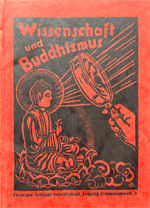100th
MP

|
THE
100th
MONKEY
PRESS |
|
|
|
Limited Editions by Aleister Crowley & Victor B. Neuburg |
|
Bibliographies |
|
Download Texts
»
Aleister
Crowley
WANTED !!NEW!!
|
|
WISSENSCHAFT UND BUDDHISMUS |
|
|
Image Thumbnails |
|||||
|
Title: |
Wissenschaft und Buddhismus (Science and Buddhism) |
|||||
|
Variations: |
|
|||||
|
Publisher: |
Thelema-Verlags-Gesellschaft.2 |
|||||
|
Printer: |
Bernhard Sporn.1 |
|||||
|
Published At: |
Leipzig, Germany.2 |
|||||
|
Date: |
1928.1 |
|||||
|
Edition: |
First German Edition. |
|||||
|
Pages: |
80.1 |
|||||
|
Price: |
1.40 Reichsmarks.1 |
|||||
|
Remarks: |
Translated from English to German by Martha Küntzel.1 |
|||||
|
Pagination: |
|
|||||
|
Contents: |
|
|||||
|
Author’s Working Versions: |
|
|||||
|
Other Known Editions: |
|
|||||
|
Bibliographic Sources: |
|
|||||
|
Comments by
Aleister |
I wrote “Ascension Day” at Madura on November 16th and “Pentecost” the day after; but my original idea gradually expanded. I elaborated the two poems from time to time, added “Berashith”—of which more anon—and finally “Science and Buddhism”, an essay on these subjects inspired by a comparative study of what I had learnt from Allan Bennett and the writings of Thomas Henry Huxley. These four elements made up the volume finally published under the title The Sword of Song. — The Confessions of Aleister Crowley. New York, NY. Hill and Wang, 1969. Pages 256-257. ______________________________
This story is typical of my magical state of the time. I was behaving like a Master of Magick, but had no interest in my further progress. I had returned to Europe with a sort of feeling at the back of my mind that I might as well resume the Abra-Melin operation, and yet the debacle of Mathers somehow put me off; besides which, I was a pretty thorough-going Buddhist. My essay “Science and Buddhism” makes this clear. I published a small private edition of “Berashith” in Paris; but my spiritual state was in reality very enfeebled. I am beginning to suspect myself of swelled head with all its cohort of ills. I'm afraid I thought myself rather a little lion on the strength of my journey, and the big people in the artistic world in France accepted me quite naturally as a colleague. — The Confessions of Aleister Crowley. New York, NY. Hill and Wang, 1969. Page 337. ______________________________
Another seed of the past began to bear fruit at this time. I had never attempted to transmit my occult knowledge as such. I had never attempted to write prose, as such, apart from short accounts of my climbs, with the exception of the preface to White Stains (Collected Works, vol. II, pp. 195-8). Berashith was my first serious attempt at an essay. That and “Science and Buddhism” were followed by a jeu d'esprit on Shakespeare (Collected Works, vol. II, pp. 185-90); “Pansil” (vol. II, pp. 192-4); “After Agnosticism” (vol. II, pp. 206-8); “Ambrosii Magi Hortus Rosarum” (vol II, pp. 212-24); “The Three Characteristics” (vol. II, pp. 225-32; “The Excluded Middle” (vol. II, pp. 262-6); “Time” (vol. II, pp. 267-82); “The Initiated Interpretation of Ceremonial Magic” (vol. II, pp. 203-4); “Qabalistic Dogma” (vol. I, pp. 265-6); the introduction to Alice, An Adultery (vol. II, pp. 58-61). Some of the ghazals of the Bagh-i-Muattar are in prose, as well as the preliminary matter; and there is Eleusis (vol. III, pp. 219-30). Most of these were written from a very curious point of view. It was not exactly that I had my tongue in my cheek, but I took a curious pleasure in expressing serious opinions in a fantastic form. I had an instinctive feeling against prose; I had not appreciated its possibilities. Its apparent lack of form seemed to me to stamp it as an essentially inferior means of expression. I wrote it, therefore, in a rather shamefaced spirit. I deliberately introduced bad jokes to show that I did not take myself seriously; whereas the truth was I was simply nervous about my achievement, just as a man afraid to disgrace himself as a boxer might pretend that the bout was not in earnest. My prose is consequently marred by absolutely stupid blasphemies against itself. — The Confessions of Aleister Crowley. New York, NY. Hill and Wang, 1969. Pages 536-537. |
|||||
|
Reviews: |
|
|||||
